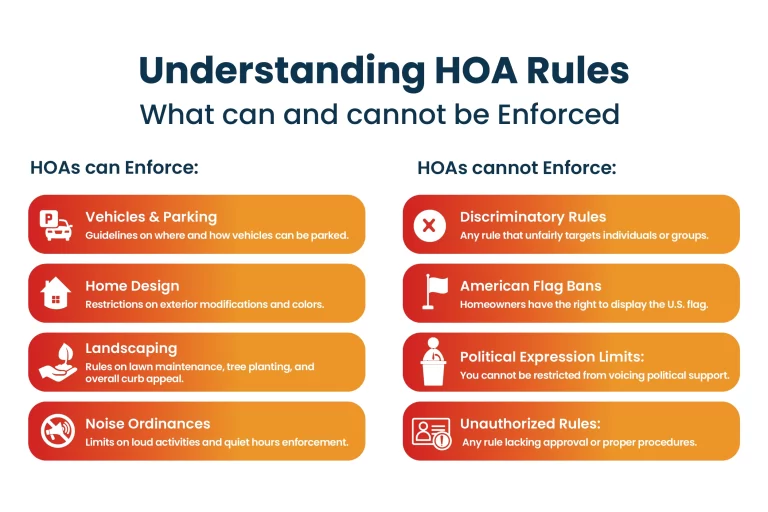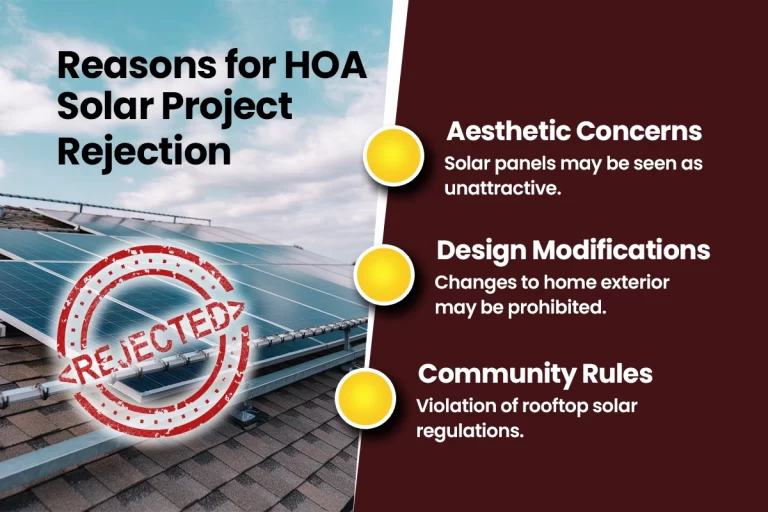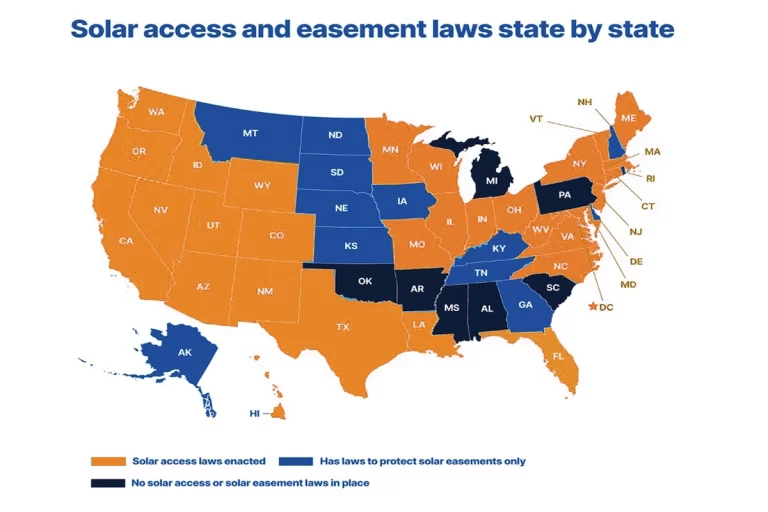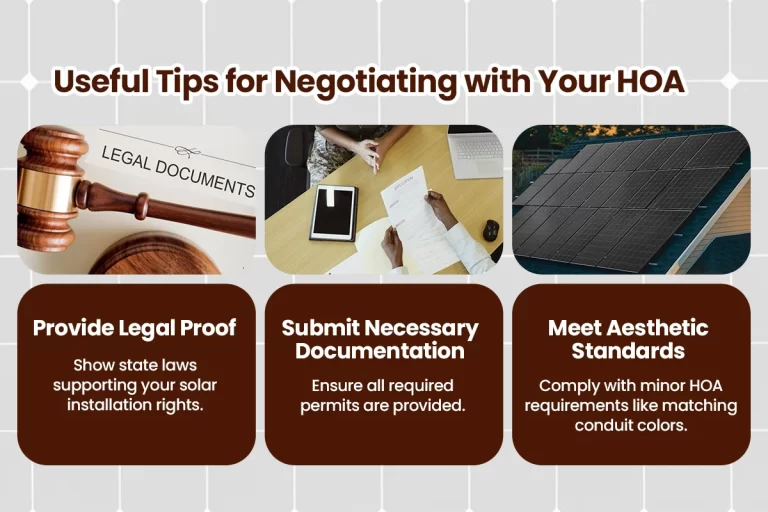- Updated On: March 13, 2025
HOA & Residential Solar Installation:
A Complete Guide
In the United States, if you reside in a subdivision, planned community, or a building, you may be a part of the Homeowners Association, also known as HOA. Living there, you can enjoy the perks of a swimming pool, gym, play area, etc., but also have to bear some extra costs. While rising energy costs and outages urge you to transition to solar, the HOA policies may challenge you with your solar project approval. How your roof or property will look with solar panel installation is among the most popular claims by an HOA to oppose a project. Also, fines, legal disputes, or, worst of all, solar project termination are some common challenges you may encounter while planning to install solar panels.

We will discuss everything you need to know about what your HOA can and cannot regulate. Also, we will assist you with solar access rights and how you can work with them to acquire solar approval. Moreover, we will share some tips to address your HOA rejection on your project design.
What is a Homeowner Association (HOA)?
An HOA is a group that establishes and upholds rules for the properties and residents in a subdivision, planned community, or housing project. Anybody who buys property in an HOA will become its member and must follow all rules and pay charges like HOA fees. While some associations may grant homeowners freedom, others may limit the freedom regarding property modifications including solar panel installation. You must abide by some rules when you live in a homeowner’s association, but there are also a few things they cannot legally impose on you. Some guidelines on what HOAs can and cannot enforce include the following:

Can my HOA prevent me from installing solar panels?
Depending on your location, an HOA can prevent you from installing solar panels by rejecting your request if you reside in a state without a solar access law. This often happens for aesthetic purposes. It makes sense that some homeowners associations may object to outside modifications like solar panels installations, as maintaining uniformity is part of their duty to protect the neighborhood’s property value. According to Zillow, a home solar panels system can boost a home’s resale value by up to 4%, which may disrupt the association’s rules. Therefore, be ready to cope with delays regarding the project’s completion time if you live in a state where HOAs typically push back.
What are the top reasons for your residential solar project rejection by HOA?
Below are some common reasons your homeowner association may give you for rejecting your home solar system install.

- They may claim that solar panels are unattractive and may lower the community’s property value. However, the reality is the opposite, as solar system installation can increase your home’s value as modern solar panels are with sleek designs and aesthetically appealing.
- As your HOA holds the right regarding home exterior modification, it may reject your project because of the home design changing rule.
- In your community agreement, there may be some restrictions mentioned regarding rooftop solar installation. In this case, your homeowner association may blame you for voiding the rules.
What are solar access rights?
With the increasing solar adoption, solar access laws are also becoming common. To protect your solar rights from HOA restrictions, about 30 states, including Washington, D.C., have various solar access rules. There are 2 major public policies: solar access laws and solar easements. Both protect your home’s ability to produce electricity through solar power.
Solar Access Laws:
State-level regulations that prevent or limit solar installations are known as solar access laws. Your homeowners’ association cannot legally stop you from installing solar on your property if you reside in a state with a solar access law. However, local permitting authorities, including HOAs, may still impose limits under these rules, such as ground-mounted panels being illegal, making rooftop installations invisible from the public right-of-way, and requiring equipment to match the roof’s color. Therefore, even if your state permits you to install solar panels on your home, you could still have to deal with some local red tape.
Solar Easements:
While solar access laws grant you the right of rooftop solar installation, solar easements give homeowners a legal way to protect their home’s exposure to sunlight. To avoid barriers like trees, house extensions, or objects on a neighbor’s lawn that shadow their panels, property owners in states with solar easements may negotiate with their neighbors.
Solar easements are voluntary, in contrast to solar access laws. A solar easement for your house must be documented. The easements need to be listed with your county’s registry of deeds, depending on the state in which you reside.
Also, it requires a full description of the dimensions where the easement will exist (i.e., the space above your rooftop, both horizontally and vertically). The terms for the easement’s termination, any payment made in return for establishing and maintaining the easement, or even penalties for violating the easement may also be included.
Which U.S. states have solar access rights?
The majority of U.S. states have solar access rights, but Alabama, Arkansas, Connecticut, Mississippi, Oklahoma, Pennsylvania, South Carolina, South Dakota, and Wyoming are among the states that still don’t have these policies. To protect your right to install solar, many states have further conditions in addition to easements and solar access laws. These regulations may change at times.

What to do if your state doesn't have solar access laws?
If you are unable to take advantage of solar access laws at the state level, don’t worry—it is still possible to go solar as a member of your homeowner’s association. To begin, make sure you are aware of the current state, local and organizational solar policies. Towns and cities may have their rules, so it is worth researching even if you live in a state without solar access laws. In addition, if you plan to navigate a solar panel installation, you should know the HOA bylaws about solar panels. If you are attempting to get approval from your HOA, emphasize the benefits of solar homes, like increased property value, low electric bills, and maximum grid independence.
What are the useful tips for negotiating with your HOA?
Despite residing in a state with solar access laws, your homeowner’s association may still make it difficult for you to install solar panels. Here are some tips for handling such scenarios:

- One of the best ways to convince your HOA with solid proof indicating they have no legal grounds for rejecting your solar installation. To find out what restrictions are legally enforced, you can research the state’s HOA and solar access laws.
- Also, it is important to submit all the relevant documentation or necessary permits for installation to your HOA. You can receive these documents from your solar installer before the home solar system install process.
- HOAs may have aesthetic standards that you must meet, but they won’t have a major impact on your solar production or design. Painting the exterior conduits, the same color as the house is a common HOA requirement. You can comply with it without investing much time or money in your solar project.
Moreover, working with a local expert solar installer near you, like Solar SME, can transform your solar journey by assisting you through the solar installation process, including HOA permitting. You can book a FREE appointment for a consultation!
Related Articles:
Solar insurance gives homeowners extra assurance that the system they invested in will produce energy as expected. Here’s a guide to everything else it does.
Every solar homeowner wants to maximize the benefits of a home solar system by producing excess electricity and gaining a high return on investment.
If you are considering installing solar panels, you may wonder about “Do solar panels work on cloudy days? It’s actually a valid concern, especially if you’re living in a region where rainy or cloudy days are common.



